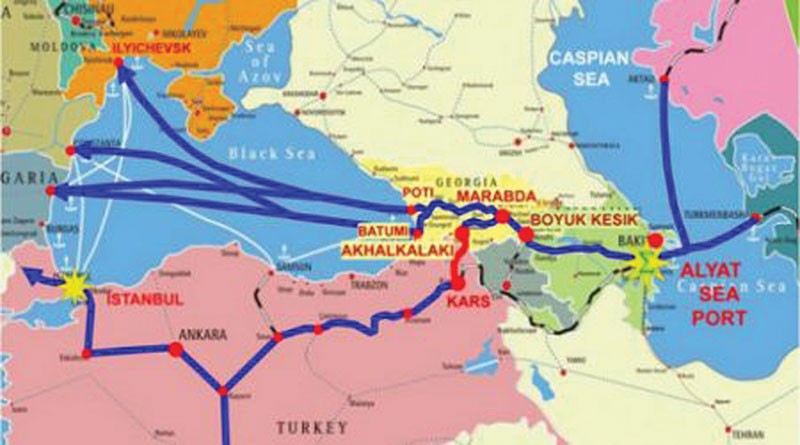Trade between Ukraine and Kazakhstan is down in 2016 compared to previous years. But with a new rail-sea transport route connecting the two nations – and bypassing Russia – there is hope on both sides for improvement.
Trade between Ukraine and Kazakhstan stands at $2 billion in 2016; in 2010 it was $5 billion.
But there is a basis for growth, according to Kazakh Ambassador to Ukraine Samat Ordabayev.
“We’ve formed a solid legal framework with more than 100 agreements in practically all sectors of international relations,” the ambassador said. “A series of projects with great potential are in the process, including the formation of transport corridors.”
Russian ban
Among the reasons for the downturn is a Moscow ban on the transit of Ukrainian goods through Russian territory enroute to Kazakhstan.
The embargo came into force on Jan.1, in retaliation for Ukraine’s free trade agreement with the European Union. A similar ban on transit to Kyrgyzstan came into force in June. Both measures are set to run until the end of 2017.
All may not be as gloomy as it appears, although an improvement depends on Ukraine’s ability to reinvigorate ties with the Russia-led Eurasian Economic Union.
“I think bilateral trade between Kazakhstan and Ukraine has good perspectives,” Azimzhan Khitakhunov, a senior lecturer at the Almaty-based KIMEP University, told the Kyiv Post. “But this depends on several factors such as economic recovery in Ukraine, recovery of bilateral trade and investment relations between Ukraine and the Eurasian Economic Union and, in particular, with Russia and Kazakhstan.”
In spite of the downturn, Ukraine was still one the top five importers to Kazakhstan in 2015, according to World Bank data. And Kazakhstan was Ukraine’s third largest trade partner among the post-Soviet states and 15th largest overall in 2015, according to the Trade and Industry Chamber of Ukraine.
But for trade with Kazakhstan to grow, political relations between Ukraine and Russia need to improve.
“As Kazakhstan and Ukraine don’t have common borders, restrictions like the Russian transit ban reduce bilateral trade,” said Khitakhunov. “Thus, normalization of trade relations requires normalization of political relations.”

Trans-Caspian Transportation Route map. (Courtesy)
New route
To overcome its reliance on transporting goods through Russia, Ukraine has stepped up development of alternative trade corridors, one of which is the Trans-Caspian International Transport Route. Beginning from the Ukrainian port of Illichivsk, it runs via the Black Sea to Georgia and Azerbaijan before crossing the Caspian Sea into Kazakhstan, eventually ending up in China.
Although the Ukrainian government sent a test shipment along the route at the beginning of 2016, the reaction from businesses has been lukewarm.
The reason is the high cost of such shipments. Viktor Dovgan, Ukraine’s deputy minister for infrastructure, said in November that shipping one container along the route costs $6,000, which is approximately 30 percent more expensive than other, better-established alternatives.
But the Ukrainian government isn’t dropping the Trans-Caspian Route: Two ferries along route are set to be launched in 2017.
The new route will need a lot of effort by both Ukrainian and Kazakh governments in order to take off.
“To increase the trade between the countries, the governments need to coordinate the work of the transport corridor and see that there are no obstacles in transit,” said Dinara Davlembaeva, marketing manager at Globalink Logistics Group, a freight-forwarding company that operates in Kazakhstan among other countries. “They must invest in the ports and other infrastructure, as well as improve the cooperation on the level of regions.”
Other nations have expressed interest in cooperating along the route, including Hungary, Turkey, and Poland. They hope it could turn into a major conduit for trade between Europe and Asia.
But Khitakhunov thinks this is unlikely.
“Kazakhstan is a landlocked country and interested in diversification of its transportation routes,” he said. The Trans-Caspian Route “can be viewed as one of the alternative routes, but it cannot play a major role.” The route may yet come in handy in connecting Ukraine and Kazakhstan while Russia’s transit ban on Ukrainian goods remains place.
Kazakh authorities have also advised Ukraine to consider further alternatives, including shipping goods via a route which would go through Turkey, Iran, Turkmenistan and Uzbekistan.
